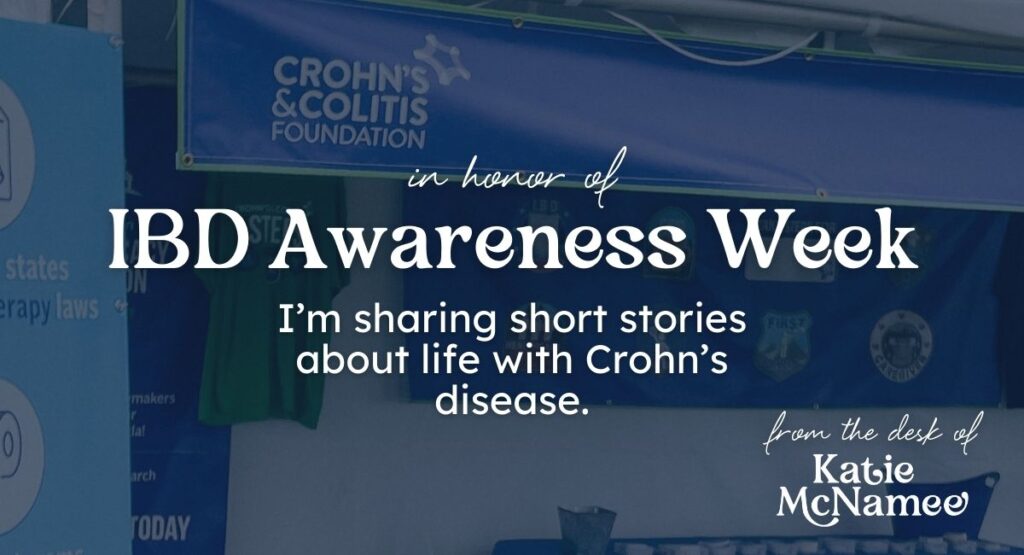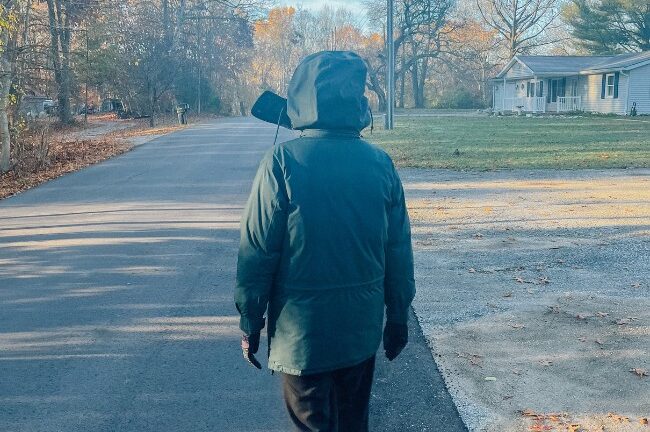Author’s Note: I wrote this story in April of 2024 when I was actively experiencing this uncertain situation. I didn’t end up sharing it then, but I feel like it fits the theme of this week well. You’ll see current, December 2024, me leave a note or two in italics throughout.
Some days, I don’t feel disabled. That’s mainly thanks to Remicade (infliximab), the autoimmune suppressant I’ve been on for over 18 years that helps manage my Crohn’s disease, bolster my energy, and keep the worst of the pain away.
But Remicade doesn’t come cheap. When my last infusion center filed the paperwork incorrectly, a notice from my insurance company appeared. There were four words at the top in bold: YOU MAY OWE $17,000.

If you’d like to sign up to join my newsletter (featuring topics on writing, chronic illness and mental health, creative entrepreneurship, and more), click here.
And for the rest of the story—keep reading.
TIME, MONEY, AND MORE

After working with my insurance, I didn’t pay $17,000, but making sure my insurance company provides me with my medication at the right time doesn’t come cheap—or easily—either.
Once again, I’m staring at a calendar after switching insurance companies, knowing that the date for my scheduled treatment approaches and being told it could take weeks for the needed insurance approval to come through.
A few extra weeks might not sound life-shattering, but I need this medicine every six weeks to maintain my health. The timing is important because I can feel when I’m due for my next dose. My bones grow heavier. My energy wanes. My symptoms flare. And I’ve talked to enough other people on Remicade to know that I’m not alone.
The longer I go past that treatment period, the worse it gets.
IN THE WHIRLPOOL OF WAITING
These periods of waiting for Remicade have forced me to spend countless weeks aching and exhausted.
The process usually looks like this:

- A change happens, either I get new insurance or have to change infusion sites (due to a move, for example)
- A prior authorization process is triggered
- This process is anything but clear from a patient POV
- After calls and emails, my doctor gets involved to send the necessary documents
- As a patient, you’re at the mercy of the authorization team (someone at the infusion site), the doctor’s office, and the insurance company as they handle the process.
- You wait, unsure of when you can expect the approval to come through. Unsure of if it will be approved.
- Eventually, somehow, someway, the authorization goes through—unless, of course, it’s denied and an appeal must be made.
- If you’re approved, you have to wait to get scheduled at the infusion site.
THE WAITING IS HARD
Three years ago, I successfully switched insurance companies, only to have my medication denied two months later. The insurance company forced me to take a biosimilar, which I desperately hoped would work but didn’t—forcing a months-long appeal process that involved multiple doctors and an MRI.
Two years ago, I was stuck in the middle as an infusion site declared the insurance company was the reason the authorization was taking so long, and the insurance company insisted the infusion site hadn’t provided what they needed to approve it.
It took them weeks to resolve the issue. At one point, I had a two-and-a-half-hour call with the insurance company, being shuttled from person to person. And that wasn’t the most painful part of the waiting, by far.
I have more stories. Like the one unfolding now (aka when I wrote this back in April 2024).
BACK IN THE UNCERTAINTY

My husband and I recently switched insurances, and I found out my current infusion site won’t be covered by the new insurance. After finding a new site connected to my doctor’s office, I asked for an emergency authorization to get a quick turnaround on the approval and receive my treatment when it was due.
Instead, the office minimized my request and told me the authorization process takes 2-3 weeks, so I should plan to wait another week (past the date of my treatment) to contact them.
I had to pause, gather myself and start advocating for the emergency auth—or anything to get a quicker response—again.
LIFE DOESN’T WAIT TO REACH OUT
Stress is more likely to make Crohn’s disease flare, and not much stresses me out as much as not knowing when I’m going to be able to get my next treatment.
I’ve been working on this. On getting more comfortable with the unknown. On resting more during these times. On giving myself grace and space to do what’s needed to keep me well in the waiting.
But there’s so much I want to do with the health I should have.

I’ve been training for the Indy Mini Marathon for months, and now, when the finish line is almost in view, I’m not sure if I’ll get my treatment in time. If I can’t get my medicine before then, I’ll have to decide if I want to force my exhausted, inflamed body to carry me through a race I intended to run as a joyful expression of what my chronically ill and disabled body can do.
And that’s just something optional.
I’m a business owner. I’m an instructor at Purdue University. I’m an author who is about to go on submission for the first time with a book that features a main character who has symptoms of my chronic illness.
I’ll do my best to put my health first and make it through this time while juggling all the many areas of life we all juggle and continuing to advocate for myself, but I have to believe that it shouldn’t be this hard. Not when so much of dealing with an illness like Crohn’s is already difficult and draining.
Getting timely access to vital medication shouldn’t be the thing that breaks anyone.
THERE HAS TO BE A BETTER WAY
I believe, deeply, everyone is trying their best to support us as patients. There are no maniacal villains out there getting joy out of seeing me suffer (I hope…)
I think every person from the doctor’s office to the insurance company to the infusion site understands how important this is. I don’t see anyone as THE problem or THE thing that needs to be solved.
But there still has to be a better way. A better system.
Patients need access to the right medication at the right time.
WORKING TO BETTER PATIENTS’ LIVES

This year, I stepped into the Advocacy Partner role for the Crohn’s & Colitis Foundation of Indiana. I’ve been learning more about the work the Foundation does to change government policies to help Crohn’s & colitis patients and families at a state and national level.
Prior Authorization is just one focus of the Crohn’s & Colitis Foundation’s advocacy work. They’re also advocating for Step Therapy reform (like the biosimilar switch I mentioned above), CoPay Assistance, Medical Nutrition Access and more.
If you would like to support these advocacy efforts or learn more, you can click here to sign up for updates about advocacy work. What I appreciate about the Advocacy updates is that they send you quick steps you can take to make a difference.
WORKING TOGETHER
If you’ve reached the bottom of this article, I appreciate you sticking through this with me. I’m not sure what the weeks ahead will hold. I hope it’s an authorization approval that comes much sooner than expected, and I apologize in advance (or maybe not…) to my doctor’s office, who I will continue to check in with.
And if I have to wait for weeks, I know I can make it through.
I’ve been made to do it before.
And I’ll hope this time, it won’t be as hard to pick myself up off the floor.
A P.S. FROM MY TREATMENT CHAIR
I wrote this blog a week ago, right after the doctor’s office’s “sit tight” note came through.
But thanks to my follow-up and a healthy dose of divine intervention, I’m not on the floor.
I’m working on posting this blog from my treatment chair (which I never got around to sharing!)

And I got my medication on time.
On time!
Today, I’m going to celebrate getting this treatment when I needed it. I’m going to rest because, whoa, did I come into this one tired. I’ll put the finishing touches on this blog and send it out into the world.
And tomorrow, I’ll resume my Crohn’s advocacy efforts. Because it might be another few months or if I’m lucky, years before I’m thrown into the insurance spin cycle again, but I can guarantee there’s someone else out there right now not knowing WHEN or IF they’ll get the medication they’ll need to be well.
They deserve to get their medication on time, too.
And without having to spend $17,000 or several months of their lives.

A P.P.S. FROM DECEMBER 2024
Thanks for jumping through time to experience this moment of my life with me. I am grateful not to have been held up from getting a treatment due to insurance since April, but my health has forced me to delay a few infusions this year (I can’t get my medicine when I’m already sick with anything viral or bacterial since my medicine is an immunosuppressant).
But that might be a story for another time.
For now…
UP NEXT: Help, I’m Not Doing Too Well: The Overlap Between Mental & Physical Health
Come back for my final blog for IBD Awareness Week, where I talk about a recent wellness retreat experience that I wonder if I wrote into existence. I’ll also be discussing the realities of living with a chronic illness, depression, and anxiety—and the complicated mix of all three.
You can also sign up for my newsletter and get the story notification sent straight to your inbox.






